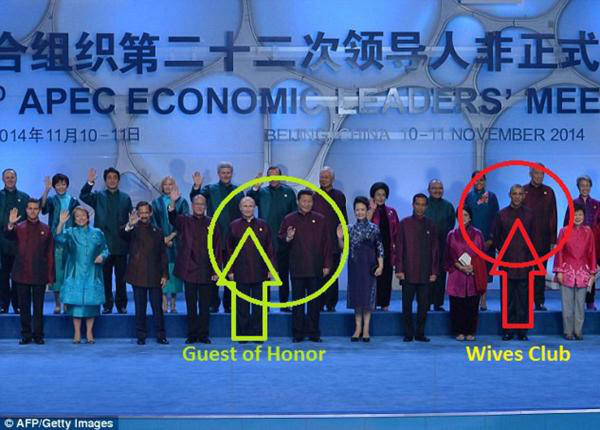-- Published: Tuesday, 11 November 2014 | Print | Disqus
Currency wars are set to warm up again, after Japan's radical decision to further debase its currency through an intensification of already significant monetary easing. There was a palpable coldness from China's Premier Xi Jinping as he greeted Japan's President Abe at the APEC summit in Beijing.

h/t Brian via Zero Hedge
Tensions are normally high between the two countries but are even more so in recent months.
War grievances run deep and are never far below the surface. Along with South Korea, these are the big industrial powers of Asia who are competing for a share of the shrinking export market.
China's economy is slowing. Official figures suggest that growth has slowed to around 7%. Some analysts say it is as low as 5%. While Western countries would rejoice at such figures it must be remembered that in 2012 China's growth in GDP was over 10%.
The decline has affected employment in China which is causing social tensions. The U.S. has put diplomatic pressure on China to not devalue its currency in recent years. So the Chinese resent Japan's unsignaled and unilateral debasement of their currency, especially if it comes with the blessing of the U.S.
It would appear as though Japan's actions were not taken at the behest of Japan's financial elites, even though they stand to gain the most from QE in the short term - especially if the U.S. experience is anything to go by.
How China will respond remains to be seen. Recent renminbi currency swap deals with Canada and Qatar show the increasing risk posed to the dollar’s status as sole global reserve currency.

If and when the dollar falls out of favour as the preeminent reserve currency it's ability to run large deficits for months on end will be greatly compromised.
The symbolism of the official photograph of the APEC summit could not be more clear. Symbolism is important to the Chinese.
In the photograph (see above) are Xi Jinping along with the leaders of Brunei, the Philippines, and Russian President Putin on the left hand side. Far to the right is Barack Obama. President Putin is at President Xi Jinping right hand.
China is emphasising it's influence in East Asia and it's good relations with Russia. The U.S. is presented as insignificant and ineffectual, at least in the affairs of East Asia.
Currency wars are set to intensify again. Indeed, Saxobank has warned of a new “full scale” currency war. We are in a full-blown currency war and the ECB will feel under pressure to take part in that,” said Nick Beecroft, non-executive chairman and senior markets consultant at Saxo Capital last week.
Chief Economist and CIO of Saxobank, Steen Jakobsen warned yesterday that there's an increasing risk we will soon see a "significant paradigm shift" from China in its attitude to the strength of its currency. He says we're about to see a full-scale currency war, notably between China and Japan, two of the world's greatest exporting countries.
Whatever action China chooses with regard to positioning the yuan as reserve currency and using its gold reserves, it seems sure that the U.S. will not be consulted. It is likely that China has enough gold bullion to dethrone the dollar in the event of a dollar crisis or a wider international monetary crisis.

Volatility in the currency markets is likely to increase greatly. If the competitive devaluation of currencies accelerate, fiat currencies risk losing value versus gold. Indeed, in worst case scenarios some may revert to their intrinsic value - zero.
When the dust settles gold will be the last man standing as it cannot be created or destroyed by governments. It remains the best form of financial insurance.
Get Breaking News and Updates on the Gold Market Here
MARKET UPDATE
Today’s AM fix was USD 1,151.25, EUR 927.90 and GBP 726.43 per ounce.
Yesterday’s AM fix was USD 1,172.00, EUR 938.20 and GBP 737.25 per ounce.
Gold fell $25.90 or 1.14% to $1,149.40 per ounce yesterday and silver slipped $0.18 or 2.2% at $15.56 per ounce.

Silver in U.S. Dollars - 10 Years (Thomson Reuters)
Gold remained firm near $1,150 an ounce as physical demand for gold bullion coins and bars especially from Chinese store of value buyers increased after yesterday's weakness.
Spot gold was flat at $1,150.45 an ounce at 1021 GMT, while Comex U.S. gold futures for December delivery fell $9.90 an ounce to $1,149.90.
Silver slipped 0.3% at $15.51 an ounce. Spot platinum was down 0.2% at $1,190.24 an ounce, while spot palladium was down 0.2 percent at $757.35 an ounce. Spot palladium was down 0.2% at $757.35 an ounce.
Access 7 Key Bullion Storage Must Haves Here
| Digg This Article
-- Published: Tuesday, 11 November 2014 | E-Mail | Print | Source: GoldSeek.com

